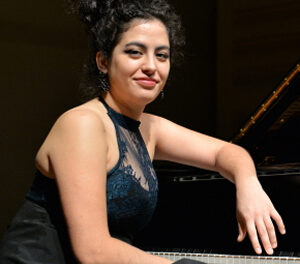Triangle Jewish Chorale has been sharing the charm, beauty, and inspiration of the various forms of Jewish music for 25 years. Since 2011, the effervescent Lorena Guillén has been their music director and has led them in significant improvement.
This concert, which took place in the Judea Reform Congregation sanctuary, featured the music of two significant local composers. Allan Friedman is the music director at Judea Reform Congregation, founder and director of SONAM (Singers Of New & Ancient Music) and, until just recently, artistic director of Woman’s Voices Chorus. He has composed the Holocaust cantata With Perfect Faith, several Psalm settings, and Erev Shabbat and Torah Service.
This concert, titled “Celebrating North Carolina Composers: Sacred and Secular Works,” began with Friedman’s American Variations on Kabbalat Shabbat. This is a set of six Psalms to be used on Friday as a preparation for the observance of the Sabbath. Each of the Psalm selections begins on a different note of a modal scale, and each has hints of the style of a well-known Jewish-American composer: Barber, Gershwin, Bernstein, Copland, etc.
The accompaniment was provided by string quartet, plus piano, bass and light percussion.
The first, Psalm 95:1-2&4, “Come let us sing joyously,” is lyrical with very nice phrasing of the text. Psalm 96:1,11-12, “Sing to Adonai a new song,” was sung with a lively and joyous presentation. The third, Psalm 97:10-11, “You shall love Adonai, hate evil”, has an earnest appeal. Psalm 98:5-9, “Sing praise to Adonai with the lyre,” has the lyrical quality of George Gershwin. Psalm 99:1,4,9, “Adonai enthroned on cherubim, is sovereign,” had a Classical quality to it. Lastly, Psalm 29:8,10-11, “The voice of Adonai kindles flames of fire,” reminded me of a first-class Broadway tune.
Shana Silverstein Barbieri, mezzo soprano, and Judith Ruderman, contralto, sang solo passages with full and rich voices. Friedman has a gift as a composer and seems to consistently link the meaning of words with meaningful music. The music of this piece also fit well with the TJC and their performance was solid.
Down Home: The Cantata is based on texts taken from recorded interviews of the “Down Home: Jewish Life in North Carolina” project and the Southern Oral History project. It tells the story of the hopes, aspirations, and realities of Jewish immigrants to our state. The text and music is by Alejandro Rutty, Associate Professor of Music Composition at UNC Greensboro.
Two movements of the cantata were heard in this concert. The first was the episode of a boy who learned to stand up for himself in an episode titled “Say You Can.” Antisemitism reared its ugly head among school children from time to time. “This one guy – he just beat the daylights out of me.” one subject relates. A friendly older boy taught him to defend himself and later, “I tore into him and beat the living hell out of him. From that day to this – ain’t too many people picked on this old man – you know that?” (I wish it would have been different, for that myth of violence solving violence always has been suspect.) The real point of the episode was to believe in yourself and “Say you can – and you will.” The episode was heard as the story was narrated over Rutty’s descriptive music in a most dramatic way.
The second movement heard was titled “The Letter,” which consisted of an excerpt from a letter by Joseph Rosengart to Herman Kahn (Cone) before Herman’s emigration from Bavaria in 1846. In beautiful and direct language, the letter urges the young man to place his trust and full confidence in God, not to be discouraged or afraid, to hold securely to his faith and be loyal to it tenets, and to be charitable if means are provided and satisfied with what he has if not. The chorus sang these lofty ideals to the stirring music provided. Six soloists from the chorus sang solo parts impressively: Liz Crisenbery, Judith Ruderman, Annette Kronmiller, Ziggy Rivkin-Fish, Xavier Richert, and Eric Meyers.
The Triangle Jewish Chorale exists to provide an opportunity for musicians to learn and share Jewish music and to increase awareness and appreciation of Jewish music among the public. This mission is accomplished through the performance of choral compositions in order to educate and entertain with the beauty and variety of Jewish-inspired musical works.
Once again, the goal of the Triangle Jewish Chorale has been held high and they have progressed in their worthy, nay, essential mission.











